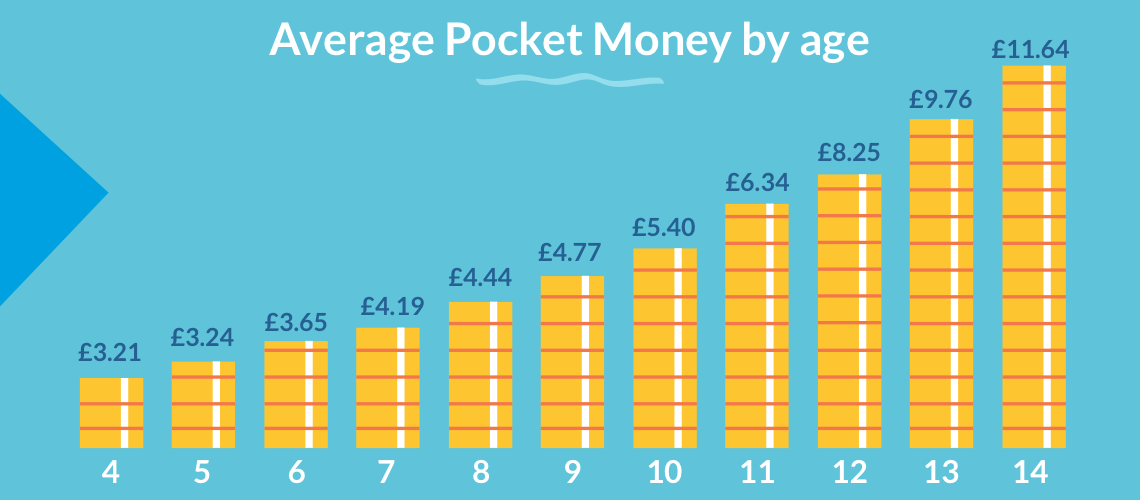Pocket Money Chores List – A Parent’s Guide
Pocket money and chores – It’s the second most popular question we get from parents, just behind ‘How much pocket money should I give?’. Every household has a different approach; ultimately it’s down to what what works for your family. There’s no wrong way to do it, but there are pitfalls you can avoid. We’ve taken a moment to explore the different options in more detail, to help you make your own mind up.
Other big questions we often get on this subject are how to get into a pocket money routine and what some age appropriate chores are, so we’ve tried to cover both those below too.
- Should you give pocket money for chores?
- Arguments for paying for chores
- Arguments against paying for chores
- Different approaches to paying for chores
- When should kids start to earn pocket money?
- How much pocket money should you give?
- Pocket money chores list: age appropriate chores
- Setting up a pocket money and chores routine
- Making your chores routine work for both of you
- Taking your chores routine to the next level
- Extra tips from our parents

1. Should you give pocket money for chores?
There’s no short answer. To an extent it’s about what you believe, but you also need to consider what’s going to work for you and your kids. Here’s a quick overview of the general pros and cons.
2. Arguments for paying for chores
The main advantage of paying for chores is teaching kids that you have to earn money. It’s a great lesson to prepare children for the real world and can help instil a sense of pride and confidence if they manage to save a lot of money by working for it.
We hear tons of stories of how children appreciate their new toys more, and look after them better, when they feel they’ve really earned them through weeks and weeks of dishwashing or raking leaves in the garden; it’s great to see that sense of accomplishment. Ultimately, if you can make that connection between earning, saving and then spending, that’s a really powerful lesson.
There’s also the undeniable truth that kids respond pretty well to incentives, so dangling the carrot of cash can genuinely help you get the chores done around the house a lot more quickly, and sometimes with a lot less nagging!
3. Arguments against paying for chores
The key argument against paying for chores is that kids should do their chores around the house regardless. We as adults don’t get paid to hoover the house, so why should our kids, and it sets unrealistic expectations for later in life. Children should grow up knowing that wherever they live, they need to ‘pull their weight’ and do their bit for the upkeep of the house.
Some people reject the idea of giving children work, almost on principle – we respect that position. With chores, there's also the potential side effect of instilling the idea that you only need to work if you’re being paid. We have heard stories of kids politely declining to take the bins out because they’ve already got enough money and don’t need to earn any more, thank you very much. That's something you might want to avoid.
Also, some believe that the main purpose of pocket money is to give your children experience of managing their own funds. You’re giving your child money each week to offer them hands-on experience of controlling it, learning lessons about not spending it all at once, saving it up for a goal etc.. You might want to avoid adding in chores here, just to keep things simpler.

4. Different approaches to giving pocket money for chores
In our experience, these are the main ways of handling chores and pocket money.
Approach: “Children need to earn their money”
Systems:
- ‘Pay-per-chore’, where you literally set a price per chore and pay the child once they’re done.
- ‘Your chores unlock your allowance’, where chores don’t have an individual value, but children need to do all of them to unlock their allowance at the end of the week, or do a portion of them to unlock a portion of their allowance.
Approach: “I shouldn’t have to pay my children to do their chores”
System:
- ‘Citizen of the household’, as part of the household children need to do your chores regardless of monetary reward. The children may get pocket money on the side, but that’s not tied to their chores, it’s there so they can practice managing money and making decisions about spending, saving and giving.
Approach: Somewhere in the middle
System:
- ‘Core jobs and extra jobs’, the idea that children do certain jobs as part of their responsibility within the household, and have the opportunity to earn extra money via agreed extra jobs.
We’ve designed our app to work with whichever system you choose!
5. When should kids start to earn pocket money?
We believe in starting young, so children and parents can start building those habits early. Remember, it doesn’t always have to be with money, at the younger ages of 2 and 3 you can start with star charts, and let your kids earn stars that they can put towards rewards. Most kids using NatWest Rooster Money’s app start receiving pocket money between 4 and 7 years old, but it’s really up to the parents. Families with more than one child will often find the younger siblings wanting to catch up with their older brothers and sisters early, so you may see things change when one child starts earning pocket money.
6. How much pocket money should you give?
At Rooster Money we are firm believers in the idea that it’s not how much you give, it’s the act of giving it regularly that’s important. Whether it’s 20p or £10 a week, the lessons the children will learn are the same. Having said that, there are certain trends we’ve seen amongst our users, so this table showing the average pocket money per age should be a helpful guide. You can find out more in our Pocket Money Index.
Average pocket money per week:
- 4 year olds – £3.21
- 5 year olds – £3.24
- 6 year olds – £3.65
- 7 year olds – £4.19
- 8 year olds – £4.44
- 9 year olds – £4.77
- 10 year olds – £5.40
- 11 year olds – £6.34
- 12 year olds – £8.25
- 13 year olds – £9.76
- 14 year olds – £11.64
There is also the other approach of ‘paying-per-chore’, in which case you can sit down with your kids and agree a price for each job, enabling them to earn different amounts each week depending on which chores they complete. It’s important they feel involved in the initial process so that they understand why they’re doing what they’re doing and why the value is different.

7. Pocket money chores list: age-appropriate chores
This is another question we get asked a lot. The answers can be quite varied; we have kids on the app doing everything from sweeping snow off the drive, to waxing surfboards. We’ve pulled together the most common chores per age, to help you get some ideas
Age-appropriate chores for 4-5 year olds
- Putting toys away
- Putting clothes in laundry bin
- Making the bed
- Tidying up bedroom
Age-appropriate chores for 6-7 year olds
- Helping set the table
- Helping clear the table
- Watering plants
- Folding laundry, sorting socks
- Looking after or feeding pets
Age-appropriate chores 8-9 year olds
- Loading dishwasher
- Emptying dishwasher
- Helping with dinner (e.g. peeling carrots)
- Hoovering
- Raking leaves
Age-appropriate chores for 10-11 years olds
- Taking bins out
- Sweeping
- Cleaning the kitchen
- Cleaning the bathroom
- Walking the dogs
Age-appropriate chores 12+ year olds
- Making dinner
- Ironing
- Mowing the lawn
- Washing windows
- Washing the car

8. Setting up a pocket money and chores routine
Whether you plan on using an online pocket money tracker to help you or not, getting into a chores routine can be difficult at first, but will help your whole family in the long run. Every household is different and you need to design a routine that works for you, but here are some of our top tips to get you started.
9. Making your chores routine work for you and your kids
Chore routines can actually be fun, and as every parent knows, if it’s fun for the kids, it will make it easier for mums and dads. You’ll be getting jobs done quicker around the house (and maybe even save some time and money), and your children will enjoy earning money while learning some valuable lessons. If you don’t feel it’s working in that way, consider changing up your system to another one of the routines outlined here.
10. Taking your chores routine to the next level
Once you’ve got your pocket money system or chores routine sorted, here are some things you can try to take it to the next level:
- New ways to earn – Encourage your kids to suggest new ways they can earn money. This should get the entrepreneurial spirit going, and be fun for the kids. It will also give you an idea of the value they put on certain tasks. Will they wash the neighbour’s cars? Will they host a garage sale? Or make sure the house is sparkling from the attic to the basement?
- Entrepreneurship – why not encourage them to get some more hands-on earning experience by running their own ventures, like a lemonade stand? It’s a really good way of teaching kids about budgeting and value too. Another great lesson could be selling their old toys at a car-boot sale or via an online resale platform; they can price things up and see how much people are willing to pay.
- Job auctions – if you have more than one child in the house, you can set out all the chores that need to be done that week (with a cost or number of stars against each one), and let your children decide which ones they want to complete. This may give you some insight into their attitudes to money, or maybe just their competitive nature!

11. Extra tips from Rooster Money parents
Let them have a go – when you’re deciding what chores to give them, don’t assume they can’t do certain things; let them try, and see how they get on. You’ll often be pleasantly surprised at what they can achieve.
Stay organised – there are tools out there that can help with your chore routine (like, ahem, Rooster Money), but there’s no getting around the fact you will need to be organised to make the routine work. The good news is, once you’re in a routine, you won’t look back.
Our app – Rooster Money can help you stay organised with your chores; find out more about our chore tracker here.
Our chore charts – if you want to start with a good old fashioned printable chart to stick on the fridge, we’ve got a customisable chore chart you can use right here.
And last, but not least – have fun. We hope the pocket money chores list above and other snippets of advice have been useful. If you have any questions, or recommendations on tips to add please get in touch at hello@roostermoney.com.